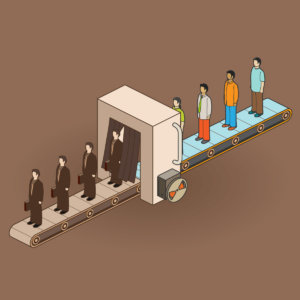When Jobs Become Commodities
Even if your job is high paying, it is wise to ask yourself whether it is common and repetitive enough to be done by a machine. If you conclude that it is, it’s time to look for — or create — less commoditized work.

Topics
Column
We don’t typically think of the jobs that we perform as commodities. The Merriam-Webster dictionary entry for commodity describes it as “a mass-produced unspecialized product.” But most of us view our jobs as specialized or somehow differentiated. We typically believe that we do them differently, and often better, than anyone else with the same job. In fact, we’d probably argue that no one does exactly the same job we do — that we perform at least a slightly different set of tasks, or perform them in a slightly different way, than any coworker.
We may well be right about that, but the world of business and management may feel otherwise. Jobs are increasingly viewed as undifferentiated and interchangeable across humans and machines — the very definition of a commodity. Outsourcing — exchanging internal employees for external ones, often offshore — was a big step toward job commoditization for many companies. Many recruiting processes lean toward commoditization, with, for instance, automated scanning of résumés. You may think you are unique, but companies increasingly view you as just one of many people who can do whatever your particular skill is, from writing Python code to managing financial assets.
Just as there are low-value and high-value commodities, there are low-value and high-value commoditized jobs. Sand is a low-value commodity, and working as a server in a fast-food restaurant is a low-value commodity job. Gold is a high-value commodity, and financial trading is increasingly becoming a high-value commodity job (more on this later). The value of many jobs is driven less by their intrinsic worth than by market demand. A recent Bloomberg Businessweek visual analytic suggests that many of the jobs that disappeared in the highest numbers in the first four months of 2017 compared with the same period in 2016 were not lost to automation, but were lost because fewer customers wanted to buy the products and services with which the jobs were associated. They include jobs in wired telecommunications, department stores, and printing.
For many organizations today, the next big driver of job commoditization is automation driven by smart machines. Simply put, if a job is viewed as a commodity, it won’t be long before it is automated.

